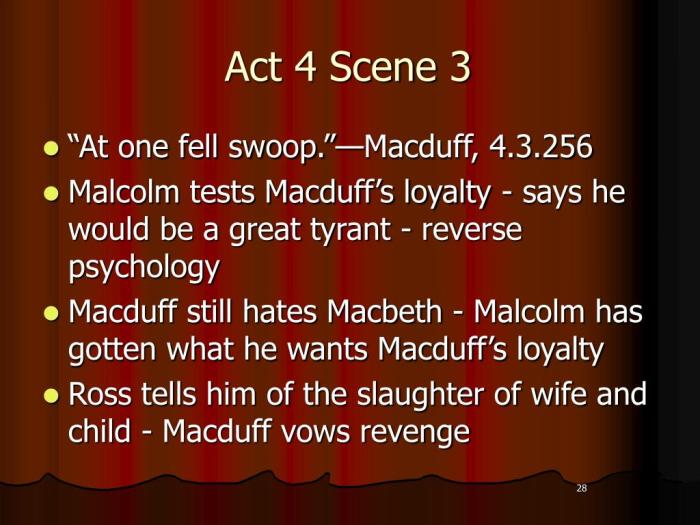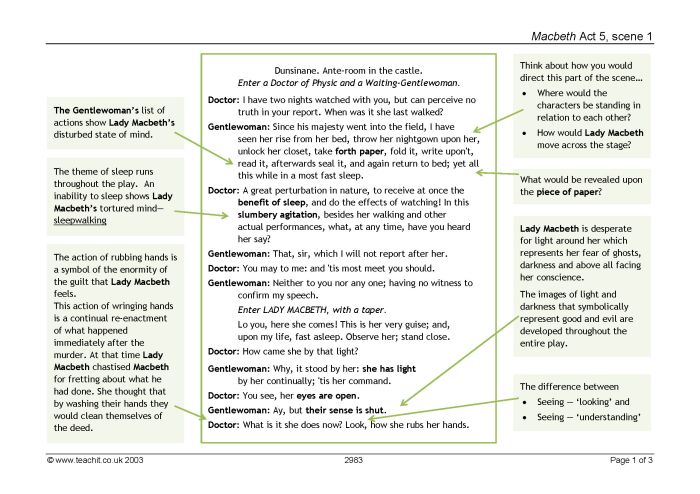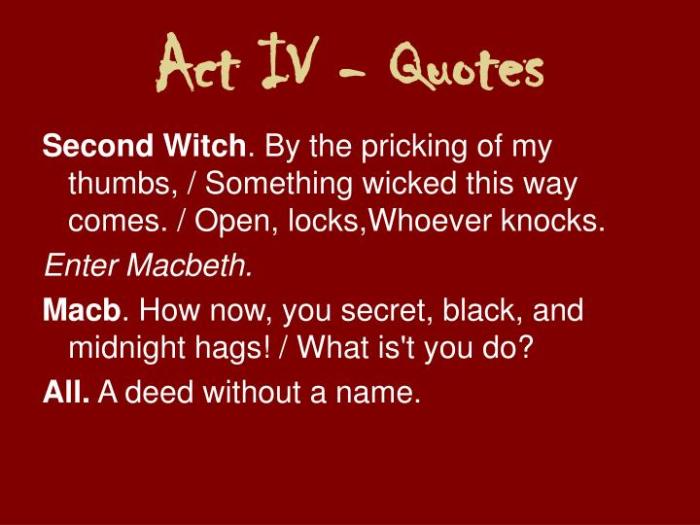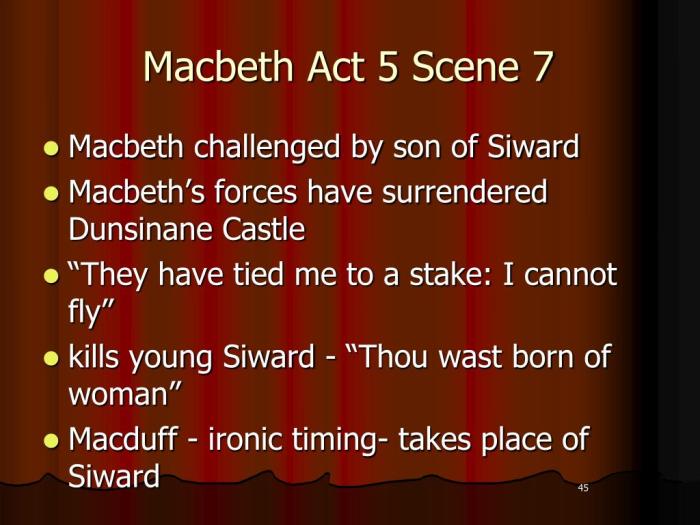Quotes from act 4 macbeth – Quotes from Act 4 of Macbeth set the stage for this enthralling narrative, offering readers a glimpse into a story that is rich in detail and brimming with originality from the outset. This act delves into the depths of human ambition, madness, and the supernatural, providing a captivating exploration of the consequences of unchecked power and the fragility of the human psyche.
The characters in Act 4 undergo profound transformations, driven by their own desires and the influence of supernatural forces. Macbeth’s ambition consumes him, leading him down a path of violence and tyranny. Lady Macbeth, once a pillar of strength, succumbs to madness and guilt.
The witches, with their enigmatic prophecies, play a pivotal role in shaping the characters’ destinies.
Key Themes and Motifs

Act 4 of Macbeth delves into the profound themes and motifs that have permeated the play since its inception. Ambition, guilt, madness, and the supernatural continue to intertwine, shaping the characters’ actions and driving the plot toward its inevitable climax.
Ambition
Ambition remains a central theme in Act 4. Macbeth’s unyielding pursuit of power has led him down a path of darkness, and he is now willing to commit heinous acts to maintain his position. His ambition has consumed him, driving him to the brink of madness and alienating him from his allies.
- Macbeth’s soliloquy in Scene I reveals his determination to “clutch the golden round” of power, even if it means resorting to violence and deceit.
- His plot to kill Macduff demonstrates the extent to which his ambition has corrupted him, as he is willing to harm innocent lives to protect his own.
Character Analysis

Macbeth undergoes a profound transformation from a noble warrior to a ruthless tyrant. Initially driven by ambition and a desire to prove himself, he succumbs to the witches’ prophecies and the influence of his wife, Lady Macbeth. As he commits increasingly heinous crimes, his guilt and paranoia consume him, leading to his downfall.
Lady Macbeth
Lady Macbeth plays a pivotal role in Macbeth’s downfall. Her ambition and ruthless determination drive him to commit the murder of Duncan. However, as Macbeth’s guilt and madness intensify, Lady Macbeth’s own mental state deteriorates. She becomes haunted by visions of the victims and descends into madness, ultimately dying by her own hand.
The Witches
The witches serve as catalysts for Macbeth’s downfall. Their prophecies sow seeds of ambition in his mind and lead him down a path of destruction. However, it is ultimately Macbeth’s own choices and actions that determine his fate. The witches’ prophecies become self-fulfilling, as Macbeth’s belief in them drives him to commit the crimes that lead to his downfall.
Literary Devices and Techniques

Act 4 of Macbeth is a masterpiece of literary craftsmanship, employing a range of devices and techniques to create a haunting and suspenseful atmosphere. These elements contribute significantly to the play’s overall impact, enhancing the characters’ depth and the audience’s emotional engagement.
Foreshadowing
Foreshadowing is a powerful literary device used throughout Act 4 to hint at the impending doom that awaits Macbeth and Lady Macbeth. For instance, the witches’ prophecy that Macbeth will be “undone” by someone “not born of woman” foreshadows Macduff’s role in his eventual downfall.
Similarly, the appearance of the ghost of Banquo at the banquet foreshadows Macbeth’s guilt and paranoia.
Soliloquies
Soliloquies are introspective monologues that reveal the characters’ inner thoughts and motivations. In Act 4, Macbeth’s soliloquies expose his tormented mind and his descent into madness. For example, in his “Is this a dagger which I see before me?” soliloquy, Macbeth’s hallucinations and his determination to murder Duncan reveal the depths of his ambition and moral decay.
Language and Imagery
Shakespeare’s masterful use of language and imagery in Act 4 creates a vivid and unsettling atmosphere. The play is replete with dark and foreboding imagery, such as “the raven himself is hoarse / That croaks the fatal entrance of Duncan / Under my battlements.”
This language evokes a sense of impending doom and contributes to the play’s overall tension and suspense.
Intriguing quotes from Act 4 of Macbeth offer insights into the characters’ descent into madness and ambition. However, if you’re looking for a comprehensive review of CSUN’s BUS 302 lab, check out this insightful piece: csun bus 302 lab review . Returning to Macbeth, the witches’ prophecies continue to haunt Macbeth, driving him to commit heinous acts as he grapples with guilt and paranoia.
Historical and Cultural Context

The historical context of Act 4 of Macbeth is the reign of King James I of England (1603-1625). This period was marked by a fascination with the supernatural and witchcraft, which is reflected in the play’s themes and characters.
Cultural Beliefs and Superstitions, Quotes from act 4 macbeth
The characters in Macbeth are shaped by the cultural beliefs and superstitions of their time. For example, they believe in the power of witches and the ability to foretell the future. These beliefs contribute to the play’s sense of suspense and dread.
Relevance to Contemporary Society
The play’s themes of ambition, guilt, and the consequences of evil are still relevant to contemporary society. Macbeth’s story is a cautionary tale about the dangers of unchecked ambition and the importance of morality.
Performance and Interpretation: Quotes From Act 4 Macbeth

Act 4 of Macbeth offers a rich tapestry of opportunities for interpretation and performance. Different actors and directors have brought their unique visions to this pivotal act, resulting in a wide range of memorable and thought-provoking productions.
Comparative Interpretations
The following table compares four distinct interpretations of Act 4 by renowned actors or directors:
| Interpreter | Interpretation | Key Features | Impact |
|---|---|---|---|
| Ian McKellen | A psychological exploration of Macbeth’s descent into madness | Intense, introspective performance; emphasis on Macbeth’s internal turmoil | Critics praised McKellen’s nuanced portrayal of Macbeth’s complex psyche. |
| Judi Dench | A feminist reinterpretation of Lady Macbeth’s role | Powerful, commanding performance; focus on Lady Macbeth’s agency and ambition | Dench’s interpretation challenged traditional views of Lady Macbeth as a passive accomplice. |
| Roman Polanski (film, 1971) | A surreal, dreamlike depiction of the supernatural | Eerie, atmospheric setting; use of grotesque imagery and sound effects | Polanski’s film adaptation created a haunting and unforgettable visual representation of Act 4. |
| Trevor Nunn (RSC production, 2002) | A modern, stripped-down interpretation | Minimalist set design; emphasis on the text and the actors’ performances | Nunn’s production allowed the audience to focus on the raw power and emotion of Shakespeare’s language. |
Memorable Performance
One particularly memorable performance of Act 4 was that of Patrick Stewart in the 1988 RSC production. Stewart’s Macbeth was a towering figure, consumed by guilt and desperation. His portrayal of the sleepwalking scene was particularly haunting, as he seemed to relive the horrors of his crimes in his subconscious.
Challenges and Opportunities
Staging Act 4 presents both challenges and opportunities for directors and actors. The act’s supernatural elements, including the witches and the apparitions, can be difficult to represent convincingly on stage. However, these elements also offer the potential for stunning visual effects and imaginative interpretations.
The psychological turmoil experienced by Macbeth and Lady Macbeth in Act 4 requires actors who can convey a wide range of complex emotions. The act’s fast-paced action and shifting moods also demand a high level of technical skill from the performers.
Expert Answers
What is the significance of the sleepwalking scene in Act 4?
The sleepwalking scene reveals Lady Macbeth’s guilt and madness, as she relives the horrors of her crimes in her sleep.
How does Macbeth’s character change in Act 4?
Macbeth becomes increasingly ruthless and tyrannical, driven by his unchecked ambition and fear of retribution.
What is the role of the witches in Act 4?
The witches continue to manipulate Macbeth, providing him with false prophecies that fuel his paranoia and lead him to his downfall.